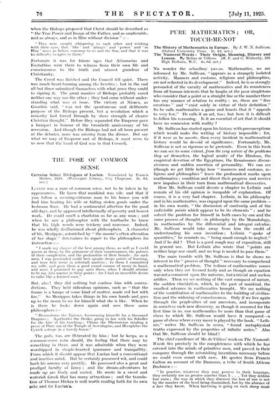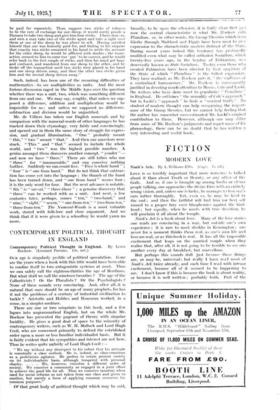PURE MATHEMATICS ; OR, TOUCH-ME-NOT
No wonder the schoolboy yawns. Mathematics, we are informed by Mr. Sullivan, " appears as a strangely isolated activity. Manners and customs, religions and philosophies, are not reflected in its development." Indeed, he is so strongly persuaded of the vacuity of mathematics and its remoteness from all human interests that he laughs at the poor simpletons who consider that a point or a straight line or the number three has any manner of relation to reality : no, these are " free creations " and " exist solely in virtue of their definition."
So he calls mathematics a game and boasts that it " appeals to very few." He calls it an art, too ; but here it is difficult to follow his reasoning. Is it an essential of art that it should have no connexion with reality ?
Mr. Sullivan has started upon his history with preconceptions which would make the writing of history impossible ; for, if it were as he asserts, then every incident in mathematical history would be devoid of significance. Fortunately, Mr. Sullivan is not so rigorous as he pretends. Even in this book
we can see to some extent, from the very nature of the problems they set themselves, the logical acuity of the Hindoos, the empirical devotion of the Egyptians, the Renaissance discur- siveness and sudden assertion of personality. We can see
(though we get little help) how " manners and customs, re- ligions and philosophies " leave the profoundest marks upon mathematics ; condition and direct their progress and receive new impulses in their turn from mathematical discoveries. How Mr. Sullivan could devote a chapter to Leibniz and remain of his old opinion is incapable of explanation. Of
course, it is a very had chapter. Leibniz, in his philosophy and in his mathematics, was engaged upon the same problem— in his own words, " the discussion of continuity and of the indivisible points which appear to be its elements " : and he
solved the problem for himself in both cases by one and the same process of thought—in philosophy by the Monadology, in mathematics by the differential and integral calculus. Mr. Sullivan would take away from him the credit of understanding his own invention ; Leibniz " spoke of quantities," he reminds us, " being small enough to neglect."
And if he did ? That is a good rough way of exposition, still in general use. But Leibniz ' also wrote that " points are neither large nor small, and no leap is needed to pass them."
The main trouble with Mr. Sullivan is that he shows no interest in the " process of thought " necessary to comprehend a mathematical problem. The tedium of mathematics comes only when they are learned lazily and as though an equation was not a comment upon the universe, but a trivial and useless artifice. Then we see nothing of the vast conquest of nature, the sudden elucidation, which, in the past of mankind, the smallest advance in mathematics brought. We see nothing of the contribution of mathematics to the building of civiliza- tion and the widening of consciousness. Only if we live again through the perplexities of our ancestors, and incorporate in ourselves each new discovery, as though it occurred for the first time in us, can mathematics be more than that game of chess to which Mr. Sullivan would have it compared—a game of chess where every move is played by the book. " Leib- niz," writes Mr. Sullivan in scorn, " found metaphysical truths expressed by the properties of infinite series." Alas that Mr. Sullivan should be blind !
The chief excellence of Mr. de Villiers' work on The Numeral- Words lies precisely in the completeness with which he has
entered into the minds of primitive men, and passed in their
company through the astonishing inventions necessary before we could even count with ease. He quotes from Francis Galton an account of the Damaras, a tribe of South African Bushmen :-- " In practice, whatever they may possess in their language, they certainly use no greater number than 3 . . . Yet they seldom lose oxen ; the way in which they discover the loss of one is not by the number of the herd being diminished, but by the absence of a face they know. When bartering is going on each sheep must be paid for separately. Thus, suppose two sticks of tobacco to be the rate of exchange for one sheep, it would sorely puzzle a Damara to take two sheep and give him four sticks. I have done so, and seen a man take two of the sticks apart and take a sight over them at one of the sheep he was about to sell. Having satisfied himself that one was honestly paid for, and finding to his surprise that exactly two sticks remained in his hand to settle the account for the other sheep, he would be afflicted with doubts ; the trans- action seemed to him to come too ' pat ' to be correct, and he would refer back to the first couple of sticks, and then his mind got hazy and confused, and wandered from one sheep to the other, and he broke off the transaction until two sticks were placed in his hand and one sheep driven away, and then the other two sticks given
him and the second sheep driven away." •
Such, indeed, has been one of the recurring difficulties of mathematics—to see multiplicities as units. And the most furious discussion raged in the Middle Ages over the question whether there was a unit, two, which was something different from one and one. We may say, roughly, that unless we sup- posed a difference, addition and multiplication would be impossible for us ; and unless we supposed no difference, subtraction and division would be unjustified.
Mr. de Villiers has taken our English numerals and by comparison with the numeral-words of other languages he has tracked down their etymology, very fairly and convincingly, and opened out in them the same story of struggle for expres- sion, and gradual illumination. " One " probably meant " this," " two " meant " that." And then our ancestors were stuck. " This " and " that " seemed to include the whole world, and " two " was the highest possible number. A genius amongst them discovers another concept, " yonder "- and now we have " three." There are still tribes who use " three " for " innumerable," and can conceive nothing further. Suddenly we can count five. " Five is whole hand " ;
" four " is " one from hand." But do not think that subtrac- tion has come yet into the language ; the thumb of the hand has been turned down, and " one from hand" means four ; it is the only word for four. But the next advance is notable. -" Six " is " sze-szi," " three-three " ; a genuine discovery that " three " can be worked with as a unit. And next, a few centuries later, perhaps, comes " ten," two-hand," and " nine," " " seven," " one-from-ten," " two-from-ten," " three-from-ten." The Numeral-Words is a most valuable work, stored with folk-lore and close argument. And we
think that if it were given to a schoolboy he would yawn no more.



























































 Previous page
Previous page